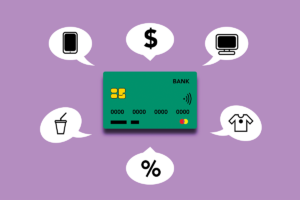How to Approach Credit-building With a Positive Mindset

What Happens to Your Credit When You Get Married or Divorced?
12/06/2022
The Future of Credit Repair and Tradelines
12/14/2022 When it comes to building credit, the right mindset can make all the difference. Although simply thinking about building credit in a positive way won’t give your credit score a boost, it might provide just the influx of energy you need to stick to your credit-building goals.
When it comes to building credit, the right mindset can make all the difference. Although simply thinking about building credit in a positive way won’t give your credit score a boost, it might provide just the influx of energy you need to stick to your credit-building goals.
Let’s explore the impact of your mindset on building credit. Plus, how you can take steps to approach this task with a positive mindset.
Why Do We Have Negative Thoughts About Building Credit?
Managing your finances effectively involves staying on top of many moving parts and pieces. Building credit is likely just one of many tasks on your financial to-do list. And frankly, building credit can feel like another chore piled on top of your other financial responsibilities.
If you have several other financial obligations to manage, building credit can often fall on the back burner. As you consider the idea of building credit, it’s natural for negative thoughts to pop into your mind. Your thoughts might categorize building credit as another chore that you don’t want to make time for.
Another reason that you might have negative feelings about your building credit is that the process can feel a bit overwhelming if you are starting from scratch. The reality is that a good credit score can have a very positive impact on your financial life. But building good credit can take a lot of time and effort, which might push you to think negatively about the entire process.
Beyond the negative thoughts you might have about your own credit-building journey, it’s possible to feel even worse when you start to compare your credit score to others. As with anything in life, it’s critical to avoid comparing your credit score to other people’s credit scores.
Why Think of Credit-building With a Positive Mindset?
If you’re approaching the process of building credit with a negative mindset, that can stall your progress. After all, negative emotions surrounding the process might encourage you to push off completing concrete tasks that will improve your credit score.
But if you are able to change your mind about credit-building, you can flip the process from being a chore to being a positive task. When you associate the task with a positive outcome, you might be more likely to follow through on your credit-building strategies.
Those able to maintain a positive mindset about this process might see momentum towards their long-term credit cards by regularly taking action.
How to Think of Building Credit as a Positive
The good news is that it’s absolutely possible to transform your mindset about building credit. If you are taking the time to read this article, you are likely ready to make a change to your credit-building mindset.
Here are some strategies you can employ to change your mind about building credit.
Interest Savings Could Change Your Finances
As you push toward your credit goals, looking at how a better credit score could change your finances is one way to transform your mindset. If you can nail down the benefits of a better credit score, you might feel motivated to actively pursue those rewards.
One of the biggest benefits that comes with a better credit score is access to better interest rates. If you need financing for a major purchase, like a vehicle or home, a better interest rate could save you thousands over the course of the loan.
For example, let’s say that Sally has a higher credit score that helps them tap into a 5% interest rate on a 30-year fixed-rate mortgage with a loan amount of $200,000. In this situation, Sally would pay a total of $189,512 in mortgage interest over the life of the loan. On the other hand, Harry has a fair credit score that leads to a 6% interest rate on his 30-year fixed-rate mortgage. With this interest rate, Harry will pay $231,676 in interest payments over the life of the loan. Ultimately, a better credit score saved Sally over $42,000.
Consider how your financial situation might change if you are able to save big on interest payments. For many, significant interest savings could transform your finances for the better. Remembering the end goal of improving your financial situation could help you stay positive about the process.
Lower Monthly Payments Can Mean Fun Times Ahead
Everyone loves to have extra room in their budget. And a better credit score could be the ticket to lower monthly payments.
With a better credit score, lower interest rates can lead to a lower monthly payment. Even if you are currently paying off debt, it’s possible to lock in lower monthly payments courtesy of a better credit score through a refinance.
Even a relatively small difference in your monthly payments can add up over time. For example, looking back at Sally, who got a 5% interest rate on a $200,000 30-year fixed-rate loan. She found a monthly payment of $1,074. In comparison to Harry’s monthly payment of $1,199, whose lower credit score led to a higher interest rate on his $200,000 30-year fixed-rate loan. Sally’s credit score helped her save $125 per month on her mortgage payments. Each month, she has the option to spend those funds on other things. In some months, she might save money. But in other months, she might decide to splurge. With this wiggle room in her budget, there’s extra room to create fun times.
Regardless of your financial situation, paying less each month due to a lower interest rate can mean more breathing room. Depending on your situation, the breathing room offered by a lower mortgage payment could make all the difference in your lifestyle.
Access to Better Rewards Can Lead to Enjoyable Splurges
When you have an excellent credit score, some doors will open. One of the big upgrades is that you’ll have access to better rewards credit cards. With a more exclusive rewards credit card in your pocket, it’s easier to access fun rewards.
For example, you might opt for a travel rewards credit card. With every purchase you make, you might be able to build up points that you’ll eventually redeem for vacation experiences. When you are spending with points, you might be more likely to treat yourself to a few extras on your trip.
Other popular rewards credit cards will provide you with cash back on your purchases. If you are looking for a way to stretch your dollars further, a cash-back credit card might do the trick. As you get rewarded for your spending, you might be able to splurge on extra treats.
If you want to make the most of your credit card spending, accessing a premium rewards credit card is more feasible with a better credit score.
Less Financial Stress
If you feel stressed about your finances, you aren’t alone. According to the Mind over Money survey conducted by The Decision Lab, 77% of Americans feel anxious about their financial situation.
Financial stress is a pervasive feeling in the U.S. One way to reduce financial stress in your own life is to work on building your credit score. Although this may seem counterintuitive because working on your credit is another financial task to accomplish, a good credit score can lead to extensive positive impacts on your financial situation. A few of the potential benefits include paying less in interest payments, finding lower monthly payments, and accessing rewards credit cards that help you get the most bang for every dollar spent.
Each of the benefits that a good credit score brings into your life can help you reduce the financial stress in your life. Since no one wants to be stressed out about money, realizing that a good credit score could push you closer to a less stressful financial situation might help you stay positive about the task at hand.
Avoid Comparisons
In our society, it’s natural to compare yourself to others. Not only is it a natural inclination, but it’s also very easy to do with an assist from social media. If you are prone to comparing different areas of your life to others, then you might start to compare your credit score to everyone else’s.
If possible, try to avoid comparing your financial situation, including your credit score, to what everyone else has. Generally, comparisons will only make you feel bad about the situation.
Instead of comparing yourself to others, compare your current credit score to your past credit score. When you look at your progress in the last quarter or last year, you might feel more positive about the situation.
Set Realistic Timelines
Whether you are building a credit score from scratch or rebuilding a credit score, these things take time. It’s important to be patient as you make choices that should positively impact your credit score over the long term.
It can take months to see the fruits of your labor reflected in your credit score. If you can be patient along the way, it’s easier to maintain a positive outlook.
Pay Off Debt
When you are stuck with an extensive amount of debt, it’s easy to feel negative about your finances. But if you are ready for a change, that might start with paying off your debts. Not only will this improve your financial situation, but it might also help you feel more in control of your money. With that positive momentum, you can put this newfound energy into improving your credit score.
How to Build Credit
Of course, staying positive about the journey is important. But it’s time to channel that positive energy into action. Here are some strategies you can use to improve your credit score.
If you’ve struggled with approaching your credit-building journey with a positive mindset, consider implementing just one strategy at a time to prevent overwhelm.
Make On-time Payments
Your payment history accounts for 35% of your FICO score. That makes it the most important part of your FICO score. After all, potential lenders want to make sure that you will make your payments on time.
With that, it’s essential to make on-time payments if you want to improve your credit score. If you struggle to remember your payment deadlines, try an automatic payment option. With this helpful assistance from technology, you won’t have to worry about forgetting a deadline in the future.
But if life throws a curveball your way that involves not having enough money to pay your bills on time, then consider reaching out to your lender. In some cases, the lender might be able to provide a temporary solution for your situation by extending the deadline or adjusting your payment plan.
Credit Repair
Inaccurate information on your credit report might be dragging your credit score down. After all, it’s unlikely that the fraudsters creating some of this negative information will be making on-time payments. If you spot a mistake on your credit report, it’s important to remove it as quickly as possible.
You can tackle this task on your own by reaching out to the credit bureaus. If you provide enough information about the mistake, it should be removed within 30 days. But be prepared to provide extensive details about the mistake.
If you don’t have the time or energy to tackle this financial to-do, it’s possible to hire a reputable credit repair company to handle it for you. When you work with a credit repair company, they’ll handle the process of removing inaccurate information from your credit score.
Credit Tradelines
Adding credit tradelines to your credit report means opening a credit account of any kind. A few examples include credit-builder loans, credit cards, and personal loans. Over time, responsibly managing these accounts may improve your credit score.
The Bottom Line
Improving your credit score is an admirable goal. If you put in the time and energy, a good credit score is well within your reach. As you take action, be mindful of your attitude. A positive attitude can help you stay the course as you work to improve your credit score.






